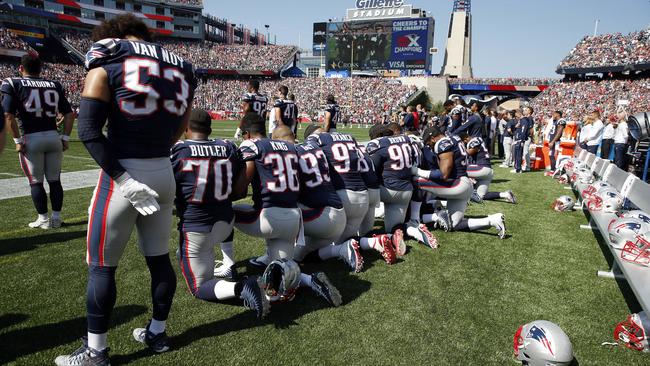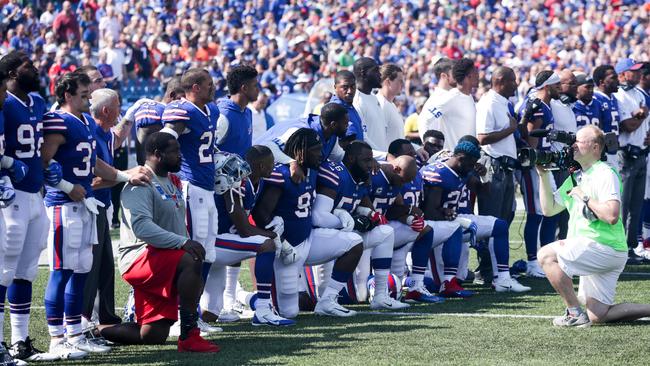NFL protests: Why ‘stick to sports’ is over | Comment
This American sports reporter wanted to steer clear of politics — but Trump has driven a monster truck onto the sports world’s front lawn.

Believe me, my friends, I wanted to “stick to sports” this weekend.
After the prior week of ESPN madness, I was eager to get back to the goofy. You know: My usual, meaningless sports insanity, with a couple of spelling errors and grammatical mistakes sprinkled in for fun.
Maybe, for a column, I’d take my kids to the annual meatball-eating contest at the Feast of San Gennaro in Little Italy. Meatball eating is basically a sport, and Tony Danza was set to host. Maybe I’d write about the men’s road cycling world championships in Norway, which the remarkable Slovak Peter Sagan won for the third year in a row. You know how I love me some bike racing and Peter Sagan. I could write about that stuff until your eyes fall out.
But then, on Friday night, the president of the United States drove a monster truck onto the sports world’s front lawn, and blasted the horn until he woke up the entire neighbourhood.
In a loud, impossible-to-miss speech, Donald Trump assailed NFL players who have been protesting during the national anthem, referring to a player who does so as a disrespectful “son-of-a-bitch” and goading team owners to fire anyone who took a knee. He also lamented what he sees as football’s over-penalising of aggressive hits — an odd choice at a moment where there is widening scientific concern about the long-term impact of head injuries.
“They’re ruining the game!” Trump said. “They want to hit.”
He didn’t stop with Alabama. By now, you know that the president spent the weekend on his Magic Twitter Machine taking on not only the NFL, but the NBA. He revoked a White House invitation to the Golden State Warriors to celebrate their basketball title, an apparent reaction to star Steph Curry’s lack of interest in going. He again urged NFL owners to fire protesting players. He further mocked the league for allegedly declining ratings and attendance, and urged fans to boycott if the protests continued.
Sports fans should never condone players that do not stand proud for their National Anthem or their Country. NFL should change policy!
— Donald J. Trump (@realDonaldTrump) September 24, 2017
If NFL fans refuse to go to games until players stop disrespecting our Flag & Country, you will see change take place fast. Fire or suspend!
— Donald J. Trump (@realDonaldTrump) September 24, 2017
The president basically took American professional sports in 2017 and set its pants on fire. And it wasn’t long before Trump was getting blowback from athletes, coaches, owners, and leagues for being unnecessarily divisive. His remarks were condemned not just by his usual detractors, but also by people who voted for him, campaigned for him, and contributed to him. Even New England Patriots owner and loyal Trump friend Bob Kraft said he was “deeply disappointed” by Trump’s NFL commentary. Fox’s Terry Bradshaw offered this exquisite Terry Bradshaw-ism: “I think our president should concentrate on serious issues like North Korea.”

The protests, meanwhile, only widened — on Sunday, more NFL players took a knee than ever before. The Pittsburgh Steelers — hardly a bunch of rosé-sipping coastal media elites — passed on the “Star-Spangled Banner” entirely, choosing to stay in the locker room. So did both sides of the Tennessee Titans-Seattle Seahawks game. The Warriors acknowledged the White House disinvite. Then the 2017 championship-winning University of North Carolina men’s basketball team announced that they, too, would not be going to the White House.
So, you can see, it’s been going really well.
No matter what side you fall on, I think we can all agree that “Stick to Sports” is officially dead as a reasonable expectation in the American sports landscape in 2017. I’ve always thought “Stick to Sports” was a ridiculous ask — politics have forever been entangled in sports. It’s really an absurd ask now, as the nation’s highest elected official has decided to turn athletes and athlete activism — and let’s be specific here, this is activism by athletes who are largely African-American — into his latest rhetorical target. A president who shortly after taking office tweeted that “Peaceful protests are a hallmark of our democracy. Even if I don’t always agree, I recognise the rights of people to express their views” has decided these particular protests (which have been tolerated by their employers) have gone too far, and is using the power of his office to put pressure on everyone involved, including fans.
The president has plenty of supporters on this issue. I don’t dispute that for a second. This is a jet fuel topic for him and anyone who wants a quick burst of attention. Long before Donald Trump repurposed the presidency into a morning sports radio talk show, there were a great many Americans who did not agree with the athlete protests, which began last season with former San Francisco 49ers quarterback Colin Kaepernick taking a knee during the anthem to protest issues affecting the African-American community, including what he viewed as unequal treatment by law enforcement. This rancour predates Trump’s victory, and I am certain that there are plenty of people who think the president is right on, and I have the hate mail to prove it. (I read all my hate mail out loud to my cat, using a cat voice.)
But a protest isn’t a popularity contest. Trump, a creature of television, is habitually obsessed with ratings, and seems to equate success or failure with Nielsen points and how many people can be stuffed into a stadium. There’s a case to be made that Trump’s railing about NFL ratings and attendance declines — “WAY DOWN” he wrote in all-caps — is factually wrong (ratings are down only mildly, for a variety of factors, and attendance last year was the NFL’s highest in a decade, and 2017 is tracking to match it thus far), but that whole discussion is irrelevant, anyway.
A protest, by definition, is always going to challenge the status quo. It is designed to cause agitation and discomfort, and maybe even cost protesters their jobs, and, in extreme cases, their lives. It isn’t the People’s Choice Awards. “This ain’t never been popular,” the author Ta-Nehisi Coates tweeted about protests over the weekend, citing, among other unpopular-in-their-time American protests, the Alabama bus boycotts, the March on Washington, and Muhammad Ali’s refusal to enlist during Vietnam.
This is hard, painful stuff. And that’s the other thing: We can either sit here on the surface of this topic and bicker glibly on social media, or we can drill deeper into what it’s really about. To make this about Trump actually does a disservice to the protesters, because these protests are not a referendum on Trump. They’re not about the flag, or the anthem, either. This has always been a protest intended to provoke a much broader and harder-to-have conversation about racial and other mistreatment in this country, and what all of us can do to get better. That’s a conversation that a number of high-profile athletes in this country want to have — and, because of the elevated place we give in this country to athletes, and all the patriotism we’ve wrapped around our sporting events, they now have a platform and our attention.
It’s also a conversation that a president of the United States can have a constructive role in, but after this weekend, I’m not sure he’s eager. “Son of a bitch”? What is going on?
This is exactly where we are now. Today, I would have loved to have given you a play-by-play of the meatball-eating contest, or the bike race, or even a Jets game. (They won!) Politics are exhausting, especially now, and I’d have loved to have to steered clear of them and stuck to sports.
But politics have barged down the door. And they look like they’re going to stay for a very long while.



